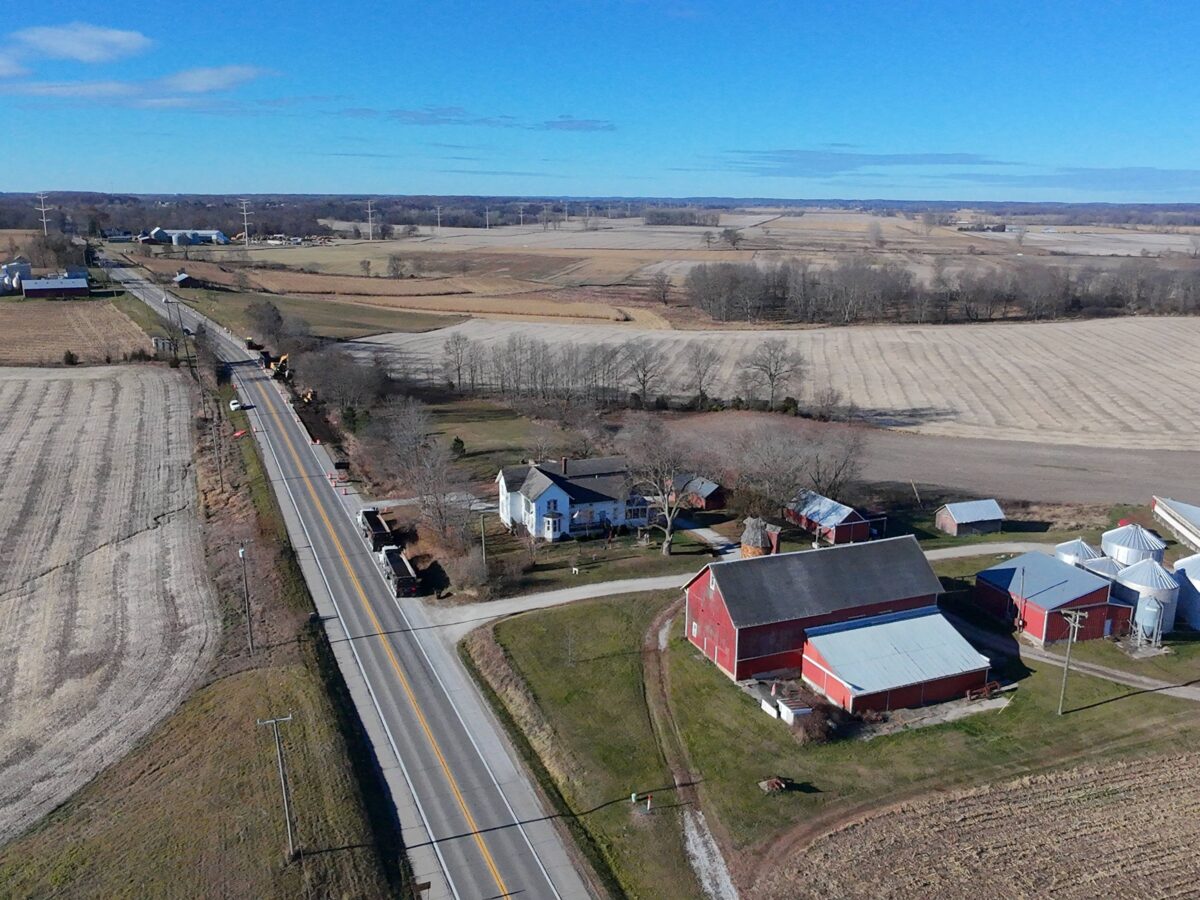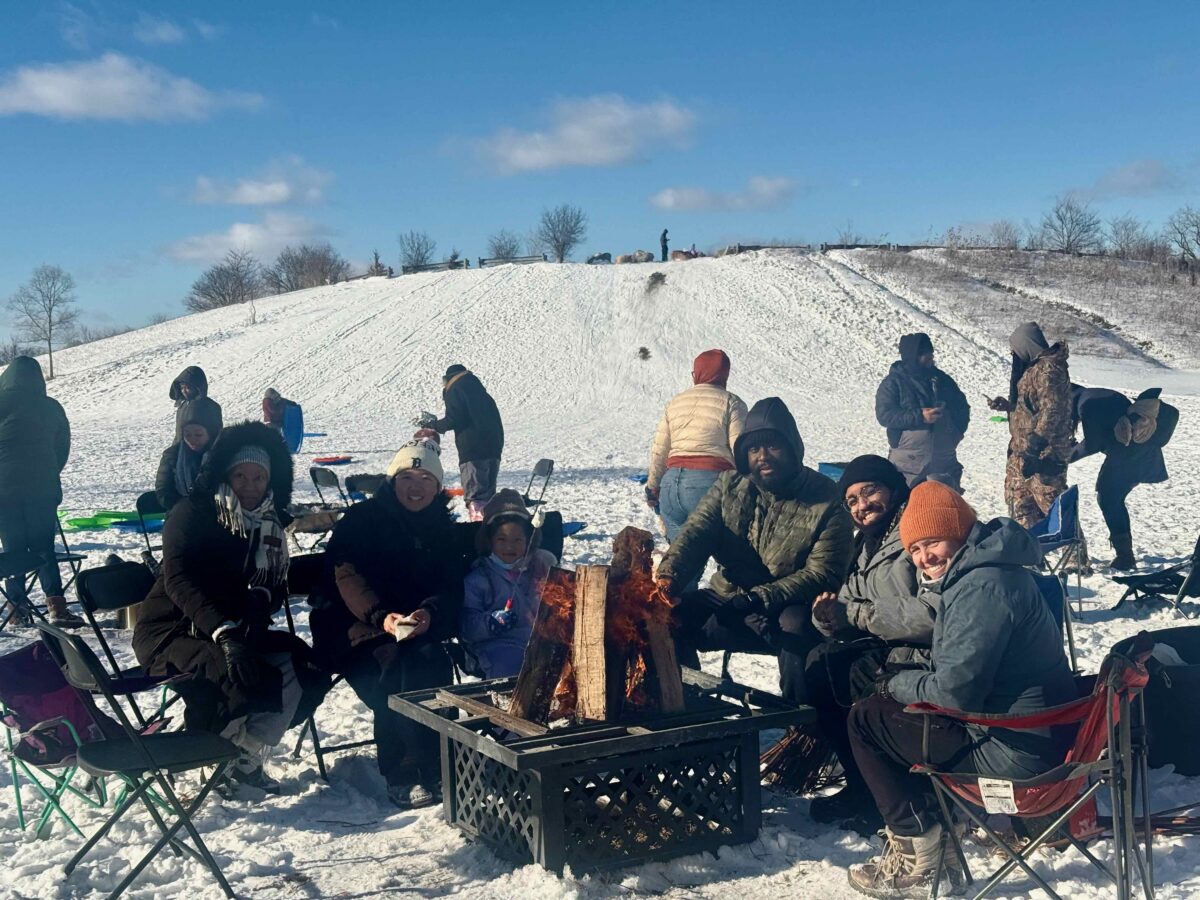Overview:
-Native American families face some of the most severe health disparities in the nation, but Miigwech Inc., a Michigan-based nonprofit, aims to change that.
- By offering culturally centered programming and advocating for Medicaid reimbursement for Indigenous doulas, Miigwech is part of a larger movement tackling the high maternal mortality rates among Native Americans.
-“Our goal is to make it so every birthing person has the support they need postpartum during pregnancy," says Miigwech founder Meredith Kennedy.
This story is published courtesy of the New York & Michigan Solutions Journalism Collaborative, of which Planet Detroit is a partner.
Native American families face some of the nation’s most stark health disparities: high maternal mortality rates, mental illness and substance abuse disorders, rooted in generations of forced assimilation, genocide and neglected treaty promises.
A Michigan-based nonprofit looks to change that with solutions powered by philanthropy and community partnerships.
Miigwech Inc., founded and led by Meredith Kennedy, has erected a system of wrap-around, culturally centered programming to help Native families heal from within by reclaiming birth traditions, parenting with sovereignty and healing generational trauma, offering a compelling case for how philanthropy can seed lasting, culturally rooted change.
For Kennedy, a citizen of the Little Traverse Bay Band of Odawa Indians, it all began with the last Indian Boarding School that operated in the United States.
She attended Holy Childhood Indian Boarding School in Harbor Springs, Mich., as her mother did before her, and her grandmother before that. Four years ago, on the Fourth of July, spurred on by international headlines about the discovery of unmarked mass graves on the grounds of Canada’s own residential boarding school system, Kennedy staged a protest outside the shuttered school, handing out fliers to educate passersby about the school’s history.
Then Kennedy thought, “OK, what’s next? So, we made a strategic plan. And got to work.”
In 2021, shortly after the protest, Kennedy founded Miigwech Inc., to assert Native sovereignty through parenthood and community. The organization seeks to restore and repair the long-lasting harm done to Native families by the boarding school system.
The boarding school represented the cruelest of systems designed to obliterate Native culture in the United States swiftly by decimating families through forced separation. The results, compounded with generations of assimilation and genocide, were a loss of culture and traditional ways, and long-lasting health inequities faced by Native families, including startlingly high maternal mortality rates.
The United States bears the highest maternal mortality rate of any developed nation, with about 800 annual deaths occurring from pregnancy-related complications. A study published in 2023 in the Journal of the American Medical Association showed that from 1999 to 2019, maternal deaths doubled nationwide. American Indian and Alaska Native mothers saw the most significant greatest increase in pregnancy-related deaths over that period, from 14 to 49.2 per 100,000 live births.
Behind the surge are myriad factors that coalesce into Native women receiving less care throughout their pregnancies than white women. In Native communities, where health care access is inhibited by geographic isolation and generational trauma, community birth workers, such as midwives or doulas — non-medical professionals who provide emotional care and guidance to pregnant mothers — are essential to safe births.
Miigwech is part of a growing movement of Native-led nonprofits innovating to confront the startlingly high maternal mortality rates among Native Americans through networks of doulas, midwives, lactation consultants and parenting coaches.
Alaska Native Birthworkers Community in Anchorage works to make birth safer for Alaska Native women who both live in urban centers and those who live in Alaska’s rural communities, some of the world’s most remote and sparsely populated areas.
In Washington state, Hummingbird Indigenous Family Services, a nonprofit providing culturally centered, full-spectrum doula care to Native families, is in the midst of a five-year pilot program that offers provides a cohort of pregnant Indigenous families a no-strings-attached monthly stipend of $1,250 until their child is 3 years old.
Miigwech supports mothers, birthing people and families through a network of programs centering the culture of Anishinaabe — people Indigenous to the Great Lakes region. From doula services to parenting classes, policy reform and voter participation, Miigwech is working to ensure that Indigenous families have access to care that reflects their traditions, values and sovereignty — and restoring the traditional family practices that were stripped away for generations.
“For generations, boarding schools and government policies tried to break our families apart,” Kennedy said. “We’re creating systems that strengthen them. We are solutions-focused. We know what our communities need, and we are building systems to make it happen.”
How it gets its funding
Native nonprofits like Miigwech receive just 0.4% of philanthropy dollars, according to Native Americans in Philanthropy, a network of Native and non-Native nonprofits that aims to increase charitable giving to Native communities.
Miigwech doesn’t take state or federal dollars; instead, it partners with philanthropic organizations and community partners. The organization is partly funded in part by the Michigan Health Endowment Fund; Tides; We the People, MI; and the Michigan Civic Education Fund.
Veronica Marchese, a program officer for the Michigan Health Endowment Fund, said that Miigwech’s focus on families resonated with the fund, which granted Miigwech $149,841 in 2023. The grant was more than $50,000 more than its operating budget in 2022, which was $97,511, according to its IRS Form 990.
The organization utilized the funds to build the board’s capacity and the knowledge of their board, and bring on an administrative coordinator to support Miigwech’s growth.
“The holistic approach to thinking about community, thinking about their board, and embedding their community voice within all of their work,” Marchese said. “All of that is important for what the health fund values. Another factor for us was that we wanted to support Miigwech’s culturally aligned approach to their programming.”
Along with building their board, the funds helped Miigwech expand into a bigger office this past winter.
“Now we have an anchored space,” Kennedy said. “Instead of using library spaces or business spaces that we know, it anchors us into a really good community space. So we can offer all of our classes, all of our workshops in our building. It’s really exciting. I’m in for the long game. My ancestors were in for the long game. That’s why I’m here.”
In 2023, the Tides Foundation gave $30,000 to support Miigwech’s SkoVOTEden campaign to register Indigenous voters and spread voting awareness among Native peoples in national, state, local and tribal elections in Michigan.
Beth Huang, program officer of Civic Engagement & Democracy at Tides, said supporting Miigwech’s voter turnout efforts is in line with the foundation’s mission to shift power to communities who have been marginalized by closing the voter participation gap by race, age and income.
“We really believe in their work as proximate leaders to know how to best communicate with Indigenous communities in Michigan,” Huang said. “We really believe that they are trusted messengers to communities in Michigan that honestly have a lot of reasons not to trust the Federal government.”
THE LATEST FROM PLANET DETROIT
Judge denies Saline Township resident’s move to intervene in data center settlement
Washtenaw County judge finds resident Kathryn Haushalter’s motion to intervene in settlement came too late and would only apply to an open case.
Trump EPA loosens coal emissions standards
Limits on mercury and other toxic emissions were first put in place by the Obama administration, which cut mercury pollution by roughly 90%. The Biden administration tightened them further.
Winter blues got you down? The solution might just be at your local Detroit park.
Detroit’s harsh winters bring more than just cold; they cast a shadow over residents’ mental health. With up to 40% of Michiganders experiencing Seasonal Affective Disorder, local groups like the Detroit Riverfront Conservancy and Friends of Rouge Park are stepping up.
Parenting is ‘a sacred responsibility’
At Miigwech, sovereignty begins at birth. For many Native communities, birth was the first ceremony of life, one that involves the community and family members and midwives or other birthworkers, referred to in many Native communities as baby catchers.
Knowledge of birthing practices was passed down through generations in the oral tradition. With colonization and forced assimilation policies built around the perverse objective to “kill the Indian, save the man,” by the 1920s, birth was moved from communities and into hospital systems designed to medicalize it, stripping traditional practices.
Doulas have been shown to reduce C-sections, low birth weight and early labor, and increase rates of breastfeeding and overall sense of well-being in mothers and babies. In the early days of launching Miigwech, Kennedy met with Michigan state Sen. Erika Geiss and learned of the lawmaker’s proposed legislation to allow doula services to be covered by Medicaid. Kennedy realized that doulas, referred to as “baby catchers” in many tribes, are part of traditional maternal care in Native communities. Medicaid reimbursement for doulas could be the entry point to true health sovereignty.
“This was the entry point for asserting treaty rights,” Kennedy said. “This is the entry point into the world of Medicaid reimbursement to make it so my community can exercise their treaty rights in their health sovereignty.”
The Doula Medicaid Reimbursement Policy went live in 2023 in Michigan. Today, 450 doulas are registered in Michigan, 60% of whom are covered by Medicaid.
Doulas who complete a training program with the Michigan Department of Health and Human Services are eligible for compensation through Medicaid. Miigwech’s Doula Initiative provides technical assistance to Indigenous doulas and doulas working in Indigenous communities, helping them to navigate the Medicaid reimbursement system, meaning that traditional birthing practices are recognized and funded.

This approach not only improves access to culturally appropriate maternal care but also creates economic independence for Indigenous birth workers — something Miigwech hopes to duplicate with other traditional healing practices.
“If we can get Medicaid to cover traditional birth work, then we can push for reimbursements for talking circles, herbal medicine, and other traditional healing practices,” Kennedy said.
Kennedy sees this as a strategic move to reclaim health sovereignty.
“Part of sovereignty is deciding to have children, how you want to have them,” Kennedy said.
The dream is to build a sustainable network of Indigenous doulas who can support their communities while also being financially independent. This year, Kennedy said Miigwech hopes to launch a two-year training cohort where Native doulas will learn how to provide traditional birthing support, breastfeeding guidance, and postpartum care.
“Our goal is to make it so every birthing person has the support they need postpartum during pregnancy, so it really creates this whole curriculum force in Michigan because they will be rooted in our treaty rights of sovereignty, education and economic,” Kennedy said.
Elizabeth Montez is a full-spectrum doula, Indigenous Lactation Counselor and citizen of the Little Traverse Bay Band of Odawa Indians. After years working in hospitality and sustainable food systems, her career in lactation has included a role as community development manager and lactation assistant at Nurturing Expressions, a boutique lactation assistance service in Seattle; and as the clinical team lead at Open Arms Perinatal Services, a nonprofit offer free lactation consulting, doula services and family support to Seattle families. Today, she runs a private practice in Harbor Springs that takes insurance. She also contracts with the Special Supplemental Nutrition Program for Women, Infants, and Children as an Indigenous Breastfeeding Community Liaison.

She met Kennedy when Miigwech was a fledgling seed of an idea. Montez, who spent most of her life in Washington, presented an opportunity to connect with her Native culture that was absent in her life growing up.
She and her family attended Auntie Craft Nights at Miigwech, where attendees make crafts while spending time in the community.
“[We] would go to every craft night and get to know people,” Montez said. “And it was just phenomenal being welcomed and brought into the community in that way. We felt very loved and held right from the beginning.”
Soon, Montez will be hosting her own gatherings through Miigwech — a drop-in parent and infant feeding group. The model scales her clinical expertise as an Internationally Certified Breastfeeding Consultant and Indigenous Breastfeeding Counselor and provides community as a balm to the isolation of new parenthood and breastfeeding.
Breastfeeding is tied to lower rates of conditions that disproportionately affect Native communities, including sudden infant death syndrome, respiratory infections, and diabetes. While breastfeeding rates in Native communities are lower than in white communities, studies show that lactation support can make a difference.
“Raising babies can be isolating,” Montez said. “And with breastfeeding, it can be intimidating. There are a lot of things that can make you think, ‘Is this normal? Am I doing this right?’ And, I wanted to make a place that would be really self-contained and safe and encouraging for folks to start breastfeeding in public, because that can be scary if you haven’t done it.”
For Montez, partnering with Miigwech feels like coming full circle.
“I can speak for myself and my family, and it has been truly transformational,” she said. “It’s that time and intentional space to connect with other native folks in a native centered space. With the history of boarding schools and everything that’s been done to our families, there’s so much rupture between us and the community, and it’s just a space that’s joyful and it’s about us and it is beautiful.”
Miigwech offers parenting classes that combine Indigenous teachings with modern parenting strategies. Partnering with Jen and Lexie Keshick of Parenting is Essential, a business that offers courses based on the curricula Motherhood is Sacred and Fatherhood is Sacred. Participants learn how to strengthen their families by learning how to express anger in a healthy way, set goals as a family to nurture bonds, and support each other in difficult times. The classes are open to Native parents, grandparents, aunts, uncles and anyone raising a child.
Jen, a citizen of the Little Traverse Bay Band of Odawa Indians, and Lexie, a citizen of the Potawatomi Band, are the only Native American married couple that teaches the curriculum, which was developed by the Native American Fatherhood and Families Association, a nonprofit founded in 2002 by Navajo and Hopi descended Albert Pooley to strengthen Native families through culturally-centered parenting classes.
The Keshicks launched their courses six years ago from their home reservation in the Hannaville Indian Community in Michigan’s Upper Peninsula. Jen said the classes seek to help restore and strengthen Native families from the adverse effects of boarding schools, forced assimilation and broken treaty promises.
“We emphasize how important parenting is — that it is a sacred responsibility,” Jen said. “When something is sacred, Native Americans tend to look at things differently. Sacred is sacrifice. How you parent matters. A lot of time, we like to say these tools are already in you and we’re just sharpening them.”
Through support from Miigwech, the Keshicks have brought their courses beyond the Hannaville reservation; now they are available online and in person, with sessions in Grand Rapids, Detroit, and other parts of Michigan.
“Every day is a new opportunity to parent in a good way,” Kennedy said. “The classes help caregivers reconnect with traditional teachings and build strong, healthy families.”
This article was reported through a fellowship supported by the Lilly Endowment and administered by the Chronicle of Philanthropy to expand coverage of philanthropy and nonprofits.





